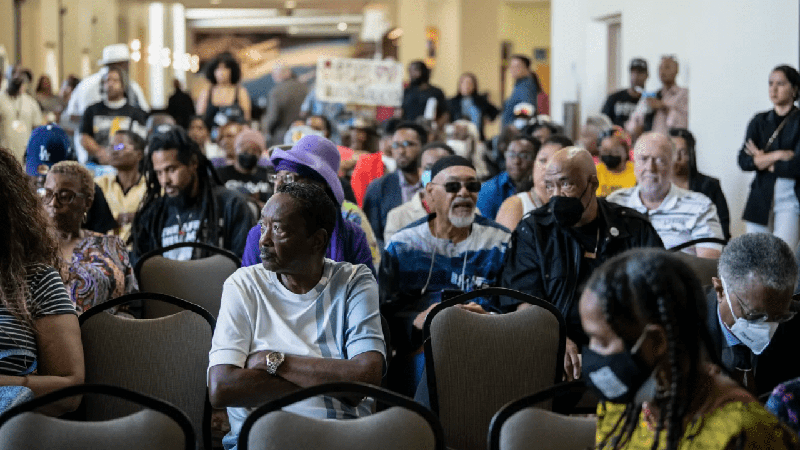Black Californians could be due hundreds of thousands of dollars for housing discrimination, incarceration, and health disparities alone.

Members of the public attend a California Reparations Task Force meeting at the California Science Center in Los Angeles on Sept. 23, 2022. Photo by Pablo Unzueta for CalMatters
By LIL KALISH, CalMatters
California’s task force on reparations has begun putting dollar figures to potential compensation for the various forms of racial discrimination, generational pain and suffering Black Americans experienced in the state.
The rough estimates by economic consultants may mean that hundreds of thousands of dollars could be due to Black Californians who are descendants of enslaved ancestors. However some politicians on the task force indicated the reparations would be a difficult case to make.
Task force member and state Sen. Steven Bradford, a Democrat representing South Los Angeles, told an audience at public meetings in Los Angeles over the weekend it would be a “major hurdle” to pass any reparations plan in the Legislature.
“For a state that didn’t have slavery, don’t think they’re going to be quick to vote on this final product of this task force,” he said. “We need to stay unified, we need to be together. We aren’t always going to agree, but we have to put forth a unified front.”
Meeting in the California Science Center Friday and Saturday, the nine-member state-appointed group invited a team of economic experts to describe reparation ideas in financial terms. It was the group’s first gathering since June, when the task force released a 500-page report on the state’s history of slavery and racism.
In March the task force voted to recommend to state leaders that if California makes some form of reparations available, they should go to Black Californians who can establish lineage to enslaved ancestors, rather than to those who are more recent immigrants, or descendants of recent immigrants. The reparations could be in the form of cash, grants, tuition assistance, loans or other financial programs, the task force said.
At this meeting, the task force described several scenarios for which Black Californians could receive monetary compensation.
Reparations Calculations
For instance, the task force considered redlining, a practice of denying mortgages to Black homeowners and of devaluing residential property in primarily minority neighborhoods.
The four economic consultants calculated that each Black Californian who lived in the state between 1933 and 1977 experienced a “housing wealth gap” of $223,239, or $5,074 for each year in the period. The experts said that number — which is the difference between the average value of all homes in California and the value of Black-owned homes — could be considered for reparations.
Such calculations are far from final, the consultants said, and there is no total estimate, though it is based on all 2.5 million Black California residents today, they said. The consultants said they haven’t calculated how many people would qualify for each type of reparation.
The consultants are William Darity, an economics professor, and A. Kirsten Mullen, a researcher, both at Duke University in Durham, N.C.; Kaycea Campbell, an economics professor at Pierce College in Los Angeles; and William Spriggs, chief economist for the AFL-CIO and a Howard University professor.
For another example of injustice, mass incarceration, the consultants calculated potential income lost by incarcerated Black Californians from 1971, the beginning of then-President Richard Nixon’s announced “War on Drugs,” until today. The economists pointed to many studies showing Black people were incarcerated far beyond their numbers in the general population.
Without discussing guilt or innocence, the economic consultants estimated that incarcerated Black residents were out $124,678, or $2,494 a year, for unpaid prison labor and years of lost income. The consultants mixed into the calculations the average salaries of California state workers and the $15,000 that some Japanese Americans received in reparations after their internment during World War II, from 1942 to 1945.
Read more of 'Reparations task force: State could owe Black Californians hundreds of thousands of dollars' on CalMatters.
CalMatters.org is a nonprofit, nonpartisan media venture explaining California policies and politics.